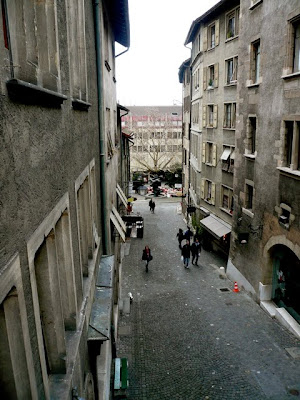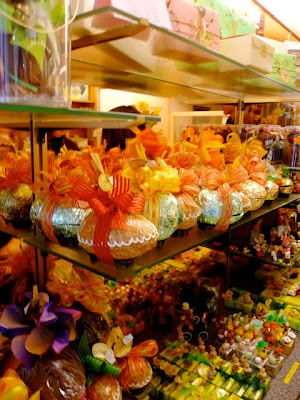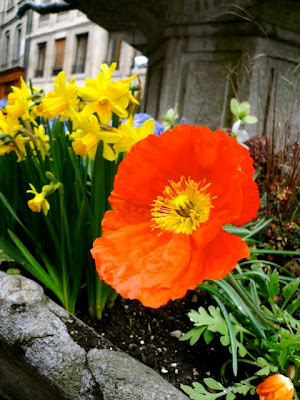


Where there was some pretty water and views of mountains...

And swans, which are more aggressive than you might think.






Seen from the streets.




Pretty food!


And flowers!



There's also a cathedral, which is actually a Protestant church (yes, really, thank you John Calvin).





We climbed to the top for some spectacular views of the Old City.



We also visited a museum with some interesting art, and I took silly pictures.


But nothing was as silly as this... even if the title is apt.
Luckily for us, everybody spoke French (albeit a slightly odd dialect of French, see below) and took our Euros. The train ride through the mountains was absolutely, stunningly beautiful.
We were, at first, puzzled when we were told something cost €4.90: "quatre euros nonante." While to most people the number "nonante" appears to be a legitimate French word, anyone who's studied French in school knows that nothing is that simple, because, as I have lamented for, oh, almost ten years now, the French language, and its numeral system in particular, is ridiculous.
Counting in French is easy up until the number 70. 4 is "quatre" so 40 is "quarante," 5 is "cinq" so 50 is "cinquante," 6 is "six" so 60 is "soixante," and 68 is just "soixante-huit." Simple, yes?
But after number 69, French goes haywire. 7 is "sept" so 70 should be "septante," right? That's what we do in English, that's what they do in Spanish, you know, it makes sense. Not so! Instead of counting "soixante-huit, soixant-neuf, septant, septant-et-un..." the French begin to do some basic addition. 70 is actually "soixante-dix," or "sixty-and-ten." So, 77 is said "soixante-dix-sept," or "sixty-and-ten-and-seven."
Yes, really. But it gets better! What happens when you get to the number 80? "Huitante?" (I admit this sounds silly.) What about "soixante-vignt?" ("Sixty-and-twenty.") That's wrong too! Actually, it's "quatre-vignt," or "four-twenties" - as in, 4 x 20 = 80. We have progressed into multiplication! So 89 is "quatre-vignt-neuf," or "four-twenties-and-nine." (How's your mental math?) So then what's 90?
Yes indeed, you guessed it. "Quatre-vignt-dix!" Instead of saying one word, the French say three and at the same time require you to do both addition and multiplication on the spot. 98? "Quatre-vignt-dix-huit." So, basically they tell you, "In order to know what number I am thinking of, first you have to multiply four times twenty, then add ten, and then add nine. Meanwhile, I will continue speaking really fast at you in French."
This system has bothered me for years. You know what they say in Switzerland? Yes. They say "septante" and "nonante" because it is obvious and intuitive, instead of making you do math with your brain that is already tired from thinking in another language.
And thus concludes my rant.
No comments:
Post a Comment